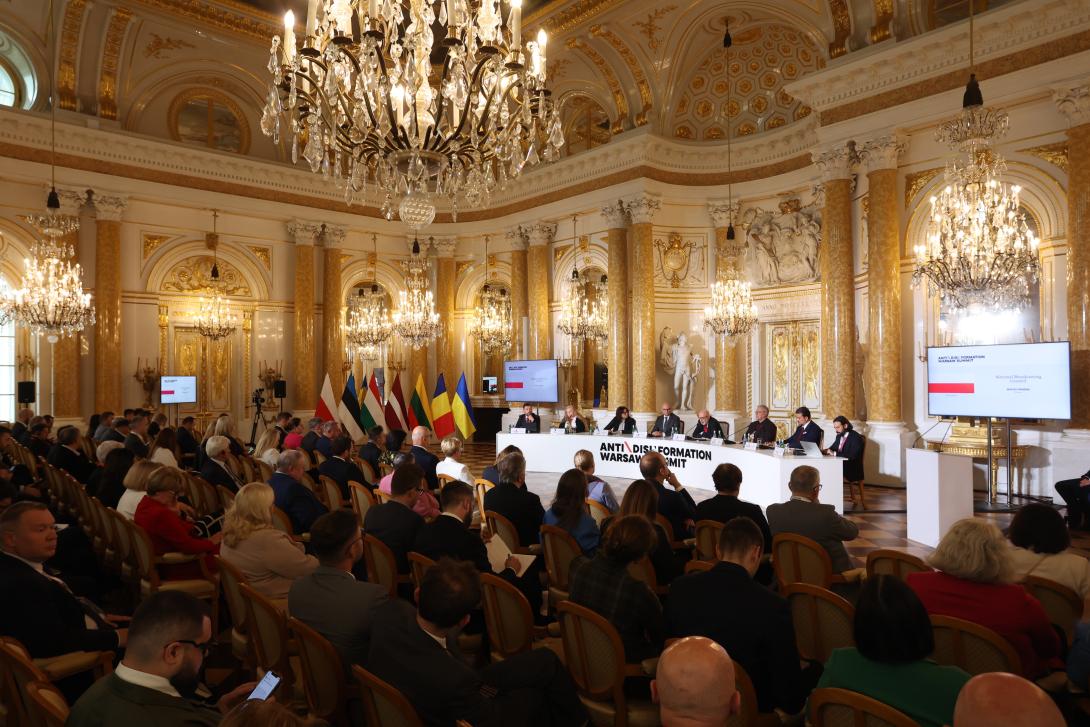
Representatives of media regulators in Poland, Ukraine, Estonia, Romania, as well as Hungary, Latvia and Lithuania met at the “Stop Disinformation and Russian Propaganda” summit to demonstrate unity in defense of freedom of speech based on reliable and truthful news.
The event, organized by the Polish National Broadcasting Council (KRRiT) at the Royal Castle in Warsaw, was further proof that the Central and Eastern European countries are constantly and loudly speaking with one voice on the issue of countering Russian disinformation.
“For centuries, the development and sovereignty of our common region has been considered by Moscow as one of the greatest threats to its global interests. This explains why this very part of Europe is particularly vulnerable to the Kremlin’s propagandists,” said Maciej Świrski, chairman of the Polish National Broadcasting Council.
During his opening speech at the summit, the chairman of the Polish National Broadcasting Council formulated five main goals facing the broader media industry in democratic countries in the context of repelling the wave of Russian fake news.
“Firstly, it is necessary to constantly strengthen the role and capabilities of credible media, providing the public with reliable and verified information. Secondly, we need to develop international cooperation and constantly share experiences and best practices,” Maciej Świrski urged.
In his view, the following elements will also be necessary: “changes in the law and adaptation of regulations to changing external circumstances, promotion of journalistic ethics, and effective communication of our activities to all audiences.”
The unprecedented intensity of the disinformation campaign is of course related to Russia’s launch of full-scale aggression against Ukraine, but its origins should be sought far in the past.
“Subsequent generations of Russians are growing up under the influence of completely false propaganda that presents a deceitful picture of the modern world. This Kremlin propaganda is of a total nature, reminiscent of the darkest Nazi or Soviet times,” stressed Olha Herasymiuk, chairwoman of the National Broadcasting Council of Ukraine.
The expert added that over the years, Russia’s aggressive policy has been met with indifference by the democratic world, largely as a result of the Kremlin’s effective propaganda and disinformation activities.
“Large-scale aggression has awakened Western societies, but this does not mean that we have won this great battle for truth in the mass media and social media. I am all the more pleased that we will work even more closely together with our friends and allies from Central Europe to counter Russian disinformation,” Olha Herasymiuk noted.
The three Baltic states that also took part in the “Stop Disinformation and Russian Propaganda” summit were represented by: Ivars Abolins (chairman of the Latvian National Electronic Mass Media Council), Rimantas Bagdzevicius (chairman of the Radio and Television Commission of Lithuania) and Helen Rohtla (president of the Department of Information Society at the Estonian Consumer Protection and Technical Regulatory Authority). It is these countries, due to their location on the map of the continent and the presence of a large Russian minority within their borders, that have been targeted by the Kremlin’s disinformation machine for years.
“That’s why our legal systems take a very strict approach to blocking TV channels, radio stations or social media profiles that reproduce Putin’s propaganda. Riga was the first capital in the EU to decide to significantly restrict Russia Today,” the Latvian representative said.
Neighboring Estonia and Lithuania have not been passive either: both countries have introduced laws suspending the operation of media outlets popular among Russian-speaking minorities that repeat the Kremlin’s narrative, and have successfully negotiated with multinational corporations (such as Google and YouTube) to block pro-Kremlin content. Vilnius immediately halted broadcasting of TV channels supported by GAZPROM after the full-scale Russian invasion against Ukraine began.
“Historically, democratic societies and their institutions, especially in the West, have too often ignored the threat posed by the aggressive and deceitful information policies of their opponents, and by the time they became aware of its scale, it was sometimes too late. Today’s summit is an important step in building true European solidarity in defense of the core value of freedom of speech based on reliable, verified information prepared by reliable sources,” said Valentin-Alexandru Jucan, vice president of Romania’s National Audiovisual Council.
In turn, Dr. György Ocskó, representing Hungary, expressed the hope that coordinated action against the spread of disinformation in the public space will soon go beyond the regional framework and will become a common policy for all of united, democratic Europe.
The centerpiece of the “Stop disinformation and Russian propaganda” summit, organized in Warsaw on October 4-5, 2023, is the signing of the “Warsaw Declaration on Combating Disinformation,” setting out a framework for cooperation among signatories to limit and expose Kremlin propaganda.


